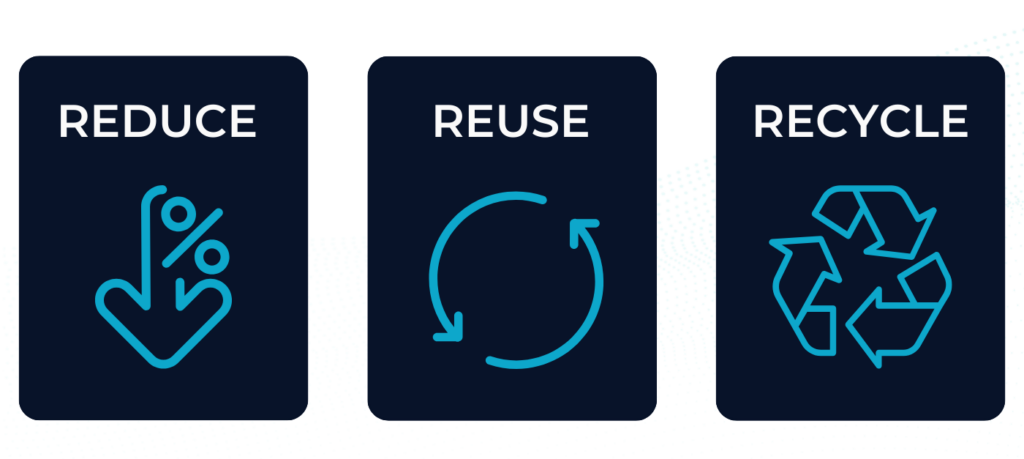As industries continue to grow, so does the demand for water – one of our most precious resources. In response, the concept of a circular economy has gained traction, aiming to minimize waste and maximize resource efficiency. Water recycling and reuse are becoming crucial strategies for businesses to reduce their environmental footprint. One of the most important technologies enabling this shift is reverse osmosis (RO), which assists industries in treating and reusing water in their processes.
Understanding the Circular Economy
The circular economy is based on three main principles:

Reduce, Reuse, & Recycle.
It shifts away from the traditional linear model of “take, make, waste” and instead focuses on creating closed-loop systems that minimize resource extraction and waste generation. This model aims to extend the lifecycle of products and materials, promoting sustainability and resource conservation across industries.
Importance of Minimizing Waste and Maximizing Resource Efficiency
By applying circular economy principles, industries can reduce their environmental impact while enhancing operational efficiency. In water treatment, this means finding ways to reduce water consumption, reuse treated water, and recycle it for various industrial processes. This approach helps conserve local water resources and reduces the strain on natural ecosystems.
Application to Water Management
By integrating water reuse into processes, industries can significantly reduce their dependence on freshwater sources. Processes like Zero Liquid Discharge (ZLD) and advanced water treatment solutions, like RO membranes, are critical for achieving these goals.
The Role of RO in Water Recycling and Reuse
RO is a water treatment process that uses a semipermeable membrane to remove contaminants from water. Under pressure, water molecules pass through the membrane, leaving behind dissolved salts, organic materials, and other impurities. This makes RO a key method for treating and purifying industrial wastewater for reuse.
Types of RO Systems Used in Industrial Water Treatment
Industrial RO systems vary in design depending on the specific water quality requirements. They can be used for many purposes, like desalinating seawater or brackish water, or treating wastewater in industrial processes. These systems are versatile and can be adjusted to suit a wide variety of industries such as manufacturing, chemical production, and power generation.
Advantages of RO for Industrial Water Reuse
High Efficiency in Removing Contaminants
RO systems are incredibly effective at eliminating a broad spectrum of contaminants, including dissolved solids, heavy metals, and various organic materials. This high level of filtration makes RO an ideal solution for industries that need to recycle water and meet increasingly strict water quality standards. When dealing with challenging pollutants, RO membranes play a key role in the process that ensures recycled water is clean and safe for reuse.
Versatility in Treating Various Types of Industrial Wastewater
One of the key strengths of RO technology is its flexibility in treating diverse wastewater streams. From cooling tower blowdown to process water from chemical manufacturing, RO can be used to treat different types of industrial wastewater. This versatility is particularly important for industries looking to reduce their reliance on freshwater resources and minimize their wastewater footprint. No matter the specific water challenges, RO plays an integral part in solutions that help businesses lower their environmental impact while still maintaining high operational standards.
Integration of RO in Industrial Processes
Some examples of applications where RO systems are used include:
1. Manufacturing and Production
Many manufacturing sectors have adopted RO to recycle process water, reducing their reliance on freshwater sources. By reusing treated water, companies can lower their overall water consumption and minimize wastewater discharge. This not only conserves water but also reduces the environmental impact of their operations.
2. Cooling and Boiler Feedwater
RO-treated water is also widely used in cooling towers and boilers. By providing clean, treated water, RO systems help improve the efficiency and longevity of these systems. Using recycled water for cooling and boilers reduces the need for expensive freshwater sources and cuts down on the discharge of contaminated water.
3. Chemical Industries
In the chemical industry, RO plays a crucial role in purifying water to be used in various processes, such as dilution, chemical reactions, and cleaning. RO systems help remove impurities and dissolved salts, ensuring that water quality meets the strict requirements for these operations. By recycling treated water, chemical plants can significantly reduce their need for fresh water and minimize the volume of hazardous wastewater that requires treatment.
Benefits of RO in the Circular Economy
Water Conservation
One of the most significant advantages of RO technology is its ability to reduce overall water consumption. By enabling the reuse of treated water, RO systems help industries conserve local water resources, alleviate the pressure on freshwater supplies, and contribute to long-term water sustainability.
Cost Savings
The integration of RO systems can lead to substantial cost savings by reducing the need to procure freshwater and lowering wastewater treatment and hauling expenses. Additionally, companies can improve their operational efficiency, reducing the overall costs associated with water use, treatment, and discharge.
Environmental Benefits
RO systems contribute to reducing wastewater discharge and pollution by enabling water reuse – often internally. This not only helps companies comply with regulations, but also reduces the environmental impact of their operations. By adopting RO technology, industries can align with sustainable practices and corporate social responsibility goals.
RO plays a vital role in advancing the circular economy by enabling water reuse in industrial processes. From reducing water consumption and operational costs to lowering environmental impacts, RO technology offers numerous benefits. As industries increasingly adopt sustainable practices, integrating RO systems into their water management strategies will be key to building a more resource-efficient, environmentally responsible future.

